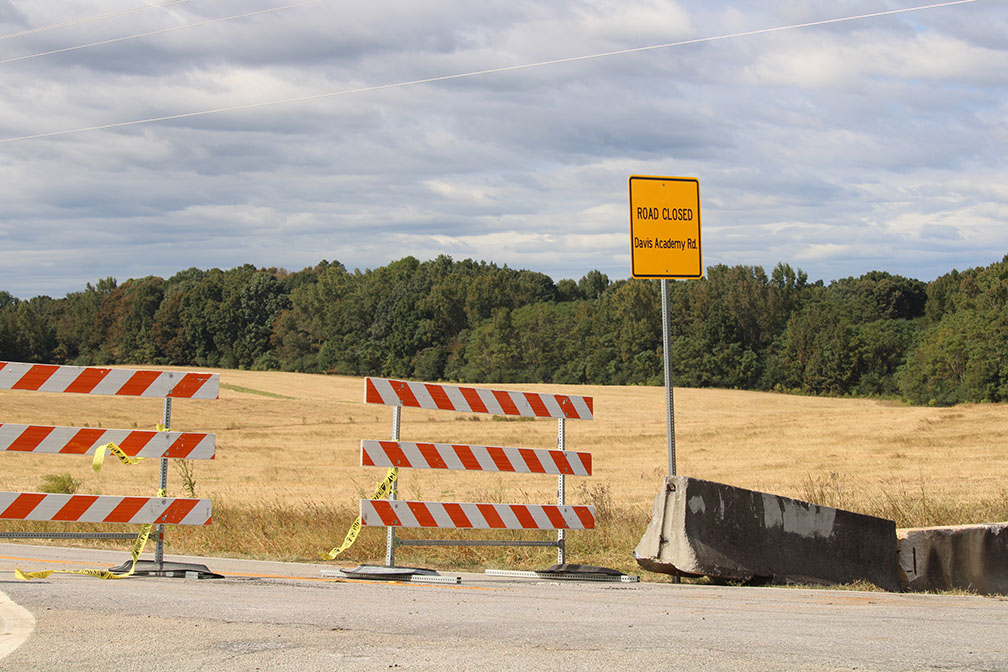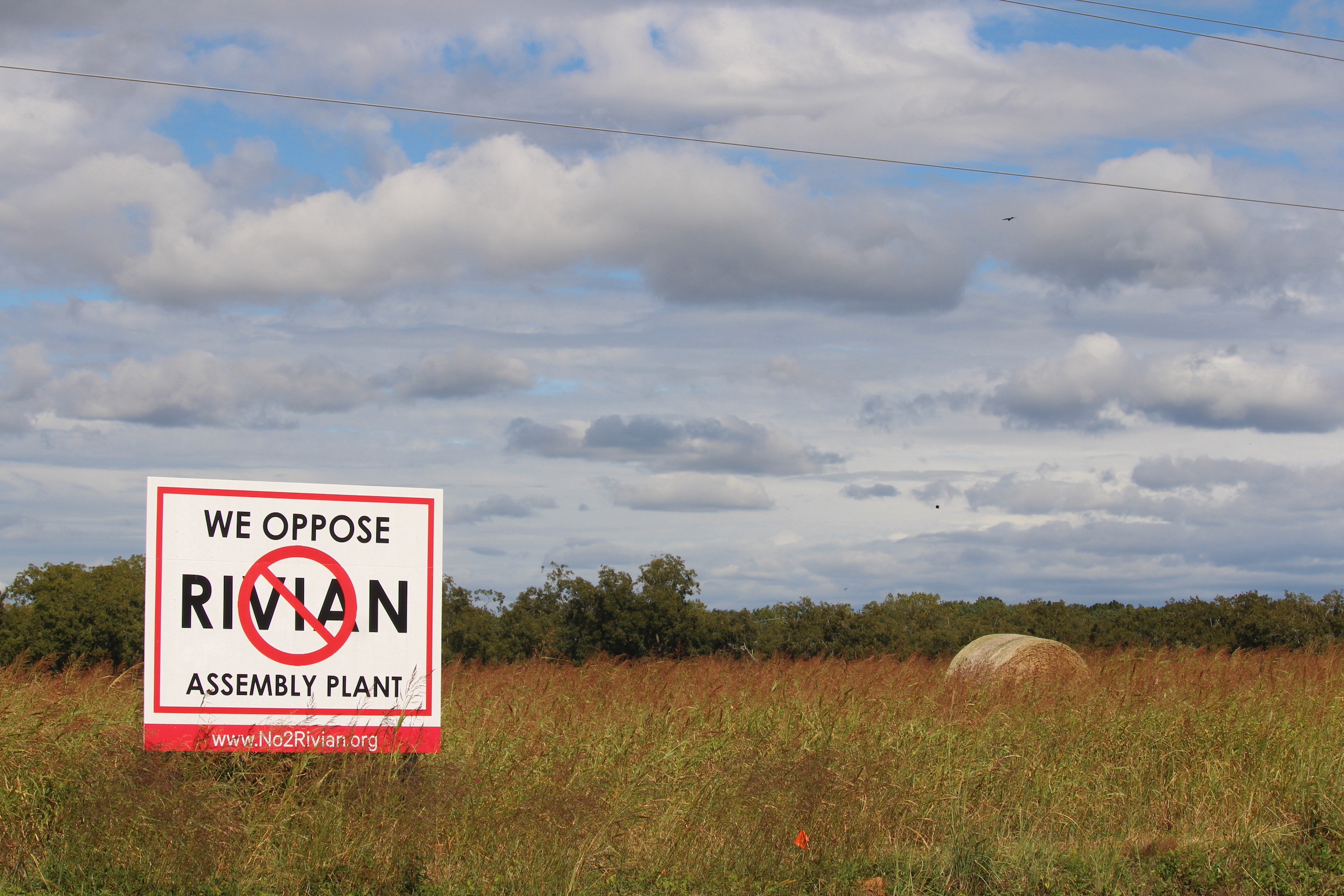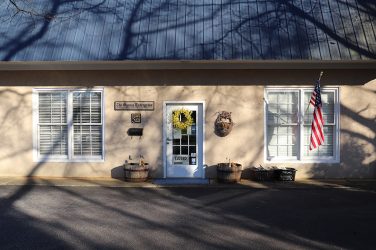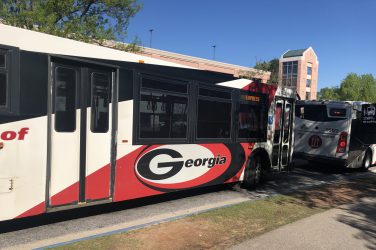On a quiet Sunday afternoon in the small town of Rutledge, Georgia, over 100 people opposing Rivian Automotive, an up-and-coming electric vehicle manufacturer, gathered in a community effort to protest the California-based company’s expansion into their neighborhood.
The Sept. 11 rally, organized by members of the thousands-large Facebook group “Our Communities Oppose Rivian Assembly Plant,” was held in a barn just two miles from the 2,000-acre site of Rivian’s plant, which is supported by over $5 billion worth of investment.
Rivian, Hyundai and Korean battery recycler SungEel HiTech Co. are all examples of prominent EV businesses flocking to Georgia. Gov. Brian P. Kemp, using tax cuts and incentive packages worth millions of dollars to draw in such companies, is determined to secure Georgia’s foothold as a manufacturing powerhouse in the flourishing EV market.
Why It’s Newsworthy: New initiatives to bring the electric vehicle industry into Northeast Georgia could strengthen the economy in rural communities near Athens, but could also harm rural communities’ ecosystems and way of life.Once Rivian begins production in 2024, officials estimate that about 400,000 vehicles per year could be manufactured, creating about 7,500 new jobs in the largely agricultural towns of Rutledge and Social Circle.
Not all residents in the area, however, are happy about Rivian’s presence.
Local politicians, community activists and a team of environmental lawyers all joined the crew of speakers at the Sept. 11 rally. JoEllen Artz, a No2Rivian group member, urged the crowd to donate to the group’s legal efforts as they prepare to file lawsuits against the company.
“This is David and Goliath, and David still has a stack of stones and a good slingshot, but Goliath doesn’t need to know how many stones David has,” Artz said.
Legal Issues Threaten Expansion
No2Rivian has threatened lawsuits against the Joint Development Authority of Jasper, Morgan, Newton and Walton counties, the board owning the site where Rivian’s plant will be located, for months. Their legal strategy includes fighting the JDA’s practice of incentivizing Rivian through means such as payment in lieu of taxes, or PILOT payments, which could exempt the company from any personal or real property taxes. Recently, however, Rivian and its supporters suffered a major blow to their progress at the hands of the Morgan County Superior Court.

On Sept. 29, Morgan County Superior Court Judge Brenda Trammell ruled against Rivian and the JDA when she refused to grant a bond agreement that would allow Rivian to avoid millions of dollars in property taxes. Rivian and the JDA plan to appeal Trammell’s decision, but until the bonds are granted, construction on the site has been put on hold.
Trammell confirmed in her decision that “the State did no analysis as to the impact the Rivian plant would have on the local communities and the additional expenses of government services” and asserted that Rivian should pay normal property taxes to support healthy growth and increased infrastructure in the rural communities around it.
Morgan County politician and No2Rivian group member Blake McCormack cites reasons such as disturbance of the natural ecosystem, air, water, and light pollution, and increased urban sprawl and traffic as reasons why Rivian’s presence in rural towns could do more harm than good. McCormack, a member of the Republican party, plans to run for Morgan County District 2 Commissioner in the upcoming midterm elections. Andy Ainslie, Morgan County District 2’s current Commissioner and JDA Vice President, will not be seeking another term.
“[The government] thinks that you can destroy this environment as long as you save another one somewhere else,” says McCormack. “It doesn’t make sense for us…we have some of the lowest unemployment in the state. Nobody has been able to sit down and show me what the benefit to the community will be.”
University of Georgia environmental economist Susana Ferreira agrees that while the plant would “certainly help” the community’s economy, its potential to impact locals’ way of life could be great.
“There are going to be local impacts, that’s pretty clear. As a neighbor, I wouldn’t be happy about the increased traffic and pollution, but no matter what, it’s going to be in somebody’s backyard,” said Ferreira.

Chas Moore, a Rutledge resident and administrator of the “Our Communities Oppose Rivian Assembly Plant” group, understands the business incentive but still opposes the plant.
“We’re business owners and we understand growth. This is an area of entrepreneurs, but there’s just no infrastructure to protect something of this scale,” Moore said.
Potential Environmental Impact
A recent Development of Regional Impact report done by the Northeast Georgia Regional Commission cautioned that hazardous waste could be released as a byproduct of Rivian’s manufacturing, and advised that extra safety measures be implemented to protect the environment.

The report also found that 92% of the plant’s site is located in a “conservation area,” and that construction may impact drinking water quality and harm surrounding wetlands. The JDA, however, contends that all appropriate measures are being taken to preserve the integrity of the site’s natural surroundings.
When contacted, press representatives for the JDA did not offer comment.
Community Support
An independently-conducted poll sponsored by the Georgia Chamber of Commerce found that just 54% of residents within the four counties were aware of the Rivian project. Of that 54%, however, the poll found a “2-to-1 advantage in support among those who are aware of it, with 49% of aware voters supporting it, and 24% opposing it.” The poll surveyed 450 people within the four counties.
State leaders also have high hopes for the positive effects that Rivian could have for future generations of Northeast Georgia residents. The JDA and other Rivian representatives have received dozens of letters of support from local authorities in the four county-area.
“While I know a project of this size has more than its share of challenges to overcome, I wholeheartedly believe these unique, well-paying jobs will not only improve the lives of the Rivian employees but have a positive impact on all business in the Jasper County,” said Mark Vaughn, a Jasper County resident and business owner, in a letter of support written in February 2022.
Rivian’s effect on the economy, environment, and way of life within rural Georgia communities is difficult to predict. As the JDA and Rivian supporters insist that the company is essential to revitalizing the mostly agricultural economies of Jasper, Walton, Newton and Morgan counties, equally vocal opponents say that their way of life is precious, and bringing in big businesses and the infrastructure needed to support them just isn’t worth it.
The future of Rivian’s presence in Northeast Georgia, along with its potential to impact citizens’ lives for better or worse, remains to be seen.
Josie Lipton is a senior majoring in journalism and art history.









Show Comments (2)
Pam Jones
Thank you for this article about the RIVIAN project and it’s potential for harm to the environment in our Community. I’m pleased to see you included Hard Labor Creek State Park and the Conservation watershed area. We in the community are all well dependent so we can’t afford any “ifs” when it comes to effects on our water. I’m a volunteer nurse with Camp Twin Lakes, in sight of the proposed 20 million sq ft 7 story high proposed heavy Industrial EV Auto Plant. Camp Twin Lakes and it’s sponsors, is home to an outdoor week long camp for special needs children. We were back this summer for the first time in two years due to the pandemic. This camp is no charge to children or parents. It allows these campers with our medical volunteers and a 1:1 ratio counselor to camper to have no limits to their camp experience! Rutledge was chosen 30 years ago for many reasons, all of which this heavy industrial MEGA plant, built at its door will take away. During the pandemic, construction began to double the size of the camp so we can serve many more special needs campers. My heart breaks to think of the negative impact RIVIAN will have on Camp Twin Lakes. I would like to mention the wildlife and all the “real green” this failing EV plant will destroy. This is a place the American Bald Eagle flys, deer and all other native wildlife abound what will happen to the wildlife with 2003 acres of pristine legacy farmland, three natural streams, and multiple ponds are graded away and all that’s left is a concrete pad if the company fails. You said grading was on hold after Our Oppositions successful effort in court on the court NOT approving the bond issue. By the time your article reached us, two weeks of grading day and night have transpired. The JDA has no intentions of putting this project on hold for environmental studies or permits. That is why they threw it to the State to bypass local citizens agricultural zoning. You may want to follow this article up with another, highlighting the lawsuit our attorney filed on our behalf to stop the grading and to reinstate our rights as citizens to have a vote on zoning. One more issue, UGA has a wonderful observatory in Hard Labor Creek State Park. They have a new telescope. The observatory is open to the public at times and a fixture now at HLC for many years. This park was chosen for its proximity to UGA and its students to learn from and because we were the darkest skies at night. It has been said that RIVIAN being built will render the Observatory useless to UGA and they may never get to use that new telescope again because of extreme light pollution from a plant that will be 3 1/2 times the size of the Pentagon in Washington DC. This put in a town without even a red light. And no infrastructure to support any of its needs. The train tracts divide the tiny town of Rutledge apart from Hwy 278 and I 20, the main routes into Rutledge and our Stste Park. Also it separates our main residential areas from our only school in Madison. A few trains a day can back up traffic in all directions. Imagine the extra 8,500 families with cars that must be brought in because our town of 1,000 and our county with help wanted signs in every window, can’t provide the workers. What will be the effect on our downtown where my husband and I own Rutledge Hardware, in continuous operation since 1891. Trains to service a plant this size would need to run continuously through our town, cutting us off from customers, schools, and visitors who come over those tracts pulling trailers to the Stsye Park many times a day. You did a great job reporting on this. I wanted to highlight these details and the fact not one poll had been conducted here where our opposition numbers 3,400 people in opposition to RIVIAN in a town with a population of appx 1,000 people. To say people are aware in polls and are in favor of this, gives a false impression. No one outside Rutledge has any idea of the size and scope of the largest heavy industrial project in the State of Georgia’s history before recently announced Hyundai, only slightly larger, placed on the site purchased by the State for RIVIAN. How it got moved here is another story, just starting to play out in court and senate hearings on rouge JDA’s with ours as the most egregious example in the State. Stay tuned, this story is far from over, along with this secret back room deal that brought it here instead of the industrial site bought for it near Savannah. That site has all the lnfastructure we lack to support a State Project of this size and scope.